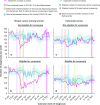The impact of the temporary suspension of national cancer screening programmes due to the COVID-19 epidemic on the diagnosis of breast and colorectal cancer in the Netherlands
- PMID: 33148289
- PMCID: PMC7609826
- DOI: 10.1186/s13045-020-00984-1
The impact of the temporary suspension of national cancer screening programmes due to the COVID-19 epidemic on the diagnosis of breast and colorectal cancer in the Netherlands
Abstract
Oncological care was largely derailed due to the reprioritisation of health care services to handle the initial surge of COVID-19 patients adequately. Cancer screening programmes were no exception in this reprioritisation. They were temporarily halted in the Netherlands (1) to alleviate the pressure on health care services overwhelmed by the upsurge of COVID-19 patients, (2) to reallocate staff and personal protective equipment to support critical COVID-19 care, and (3) to mitigate the spread of COVID-19. Utilising data from the Netherlands Cancer Registry on provisional cancer diagnoses between 6 January 2020 and 4 October 2020, we assessed the impact of the temporary halt of national population screening programmes on the diagnosis of breast and colorectal cancer in the Netherlands. A dynamic harmonic regression model with ARIMA error components was applied to assess the observed versus expected number of cancer diagnoses per calendar week. Fewer diagnoses of breast and colorectal cancer were objectified amid the early stages of the initial COVID-19 outbreak in the Netherlands. This effect was most pronounced among the age groups eligible for cancer screening programmes, especially in breast cancer (age group 50-74 years). Encouragingly enough, the observed number of diagnoses ultimately reached and virtually remained at the level of the expected values. This finding, which emerged earlier in age groups not invited for cancer screening programmes, comes on account of the decreased demand for critical COVID-19 care since early April 2020, which, in turn, paved the way forward to resume screening programmes and a broad range of non-critical health care services, albeit with limited operating and workforce capacity. Collectively, transient changes in health-seeking behaviour, referral practices, and cancer screening programmes amid the early stages of the initial COVID-19 epidemic in the Netherlands conjointly acted as an accelerant for fewer breast and colorectal cancer diagnoses in age groups eligible for cancer screening programmes. Forthcoming research is warranted to assess whether the decreased diagnostic scrutiny of cancer during the COVID-19 pandemic resulted in stage migration and altered clinical management, as well as poorer outcomes.
Keywords: COVID-19; Cancer; Epidemiology; Incidence; Population-based; Registry; Screening.
Conflict of interest statement
None.
Figures

References
-
- Maringe C, Spicer J, Morris M, Purushotham A, Nolte E, Sullivan R, et al. The impact of the COVID-19 pandemic on cancer deaths due to delays in diagnosis in England, UK: a national, population-based, modelling study. Lancet Oncol. 2020;21:1023–1034. doi: 10.1016/S1470-2045(20)30388-0. - DOI - PMC - PubMed
Publication types
MeSH terms
LinkOut - more resources
Full Text Sources
Medical
Miscellaneous

